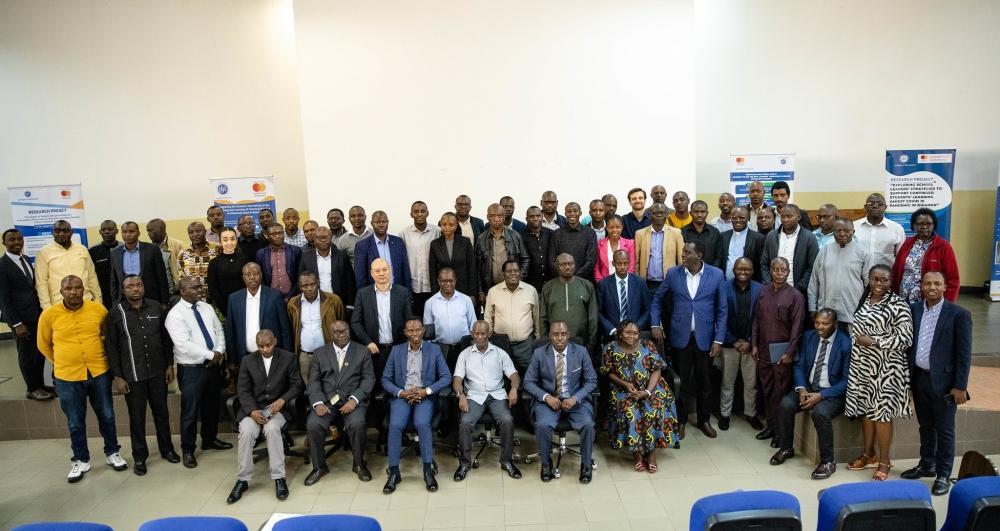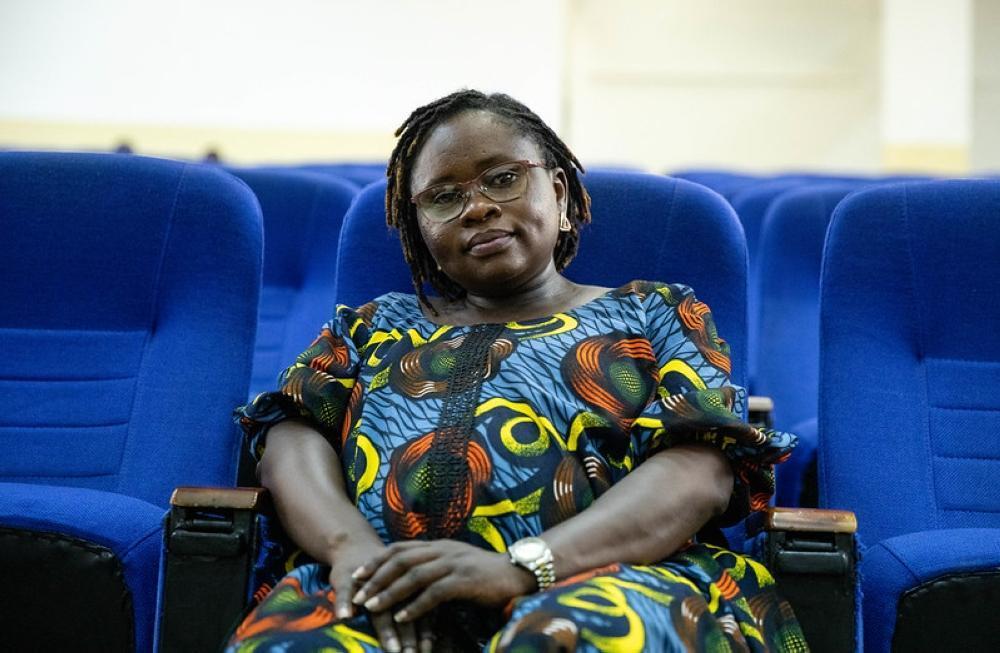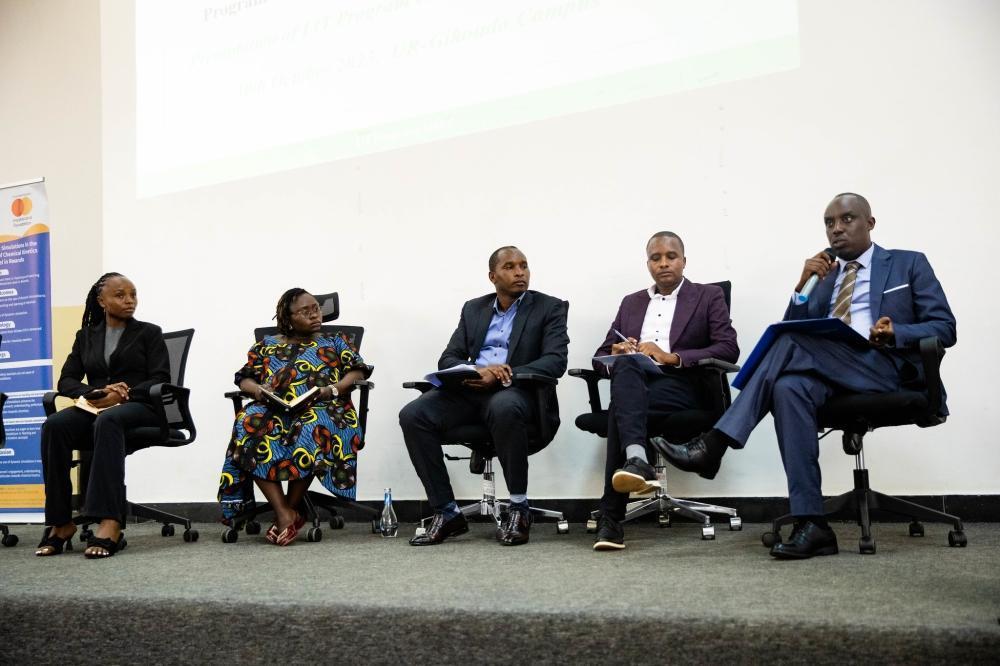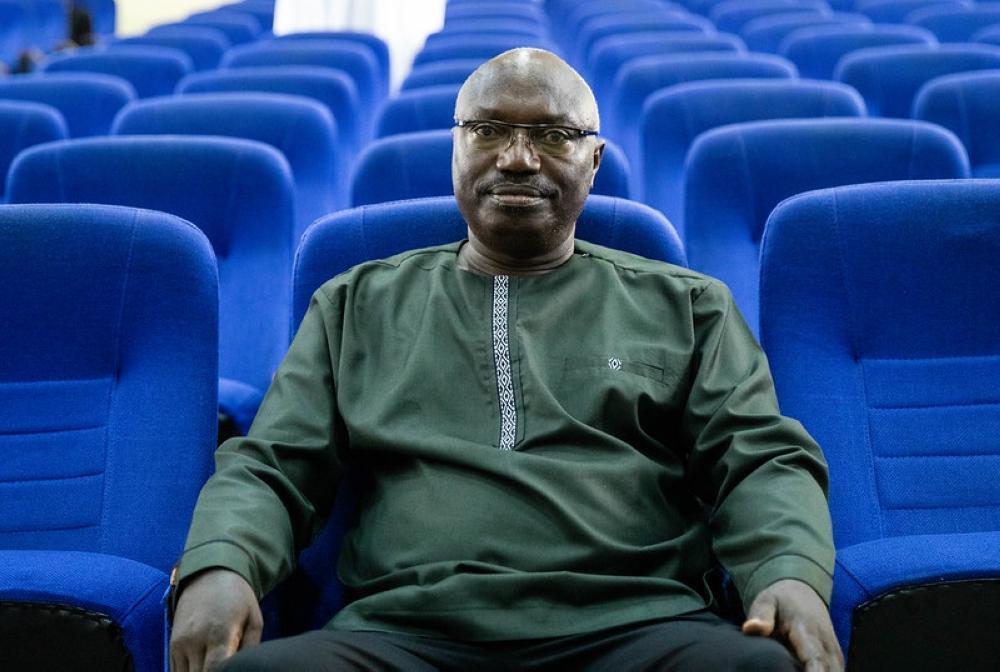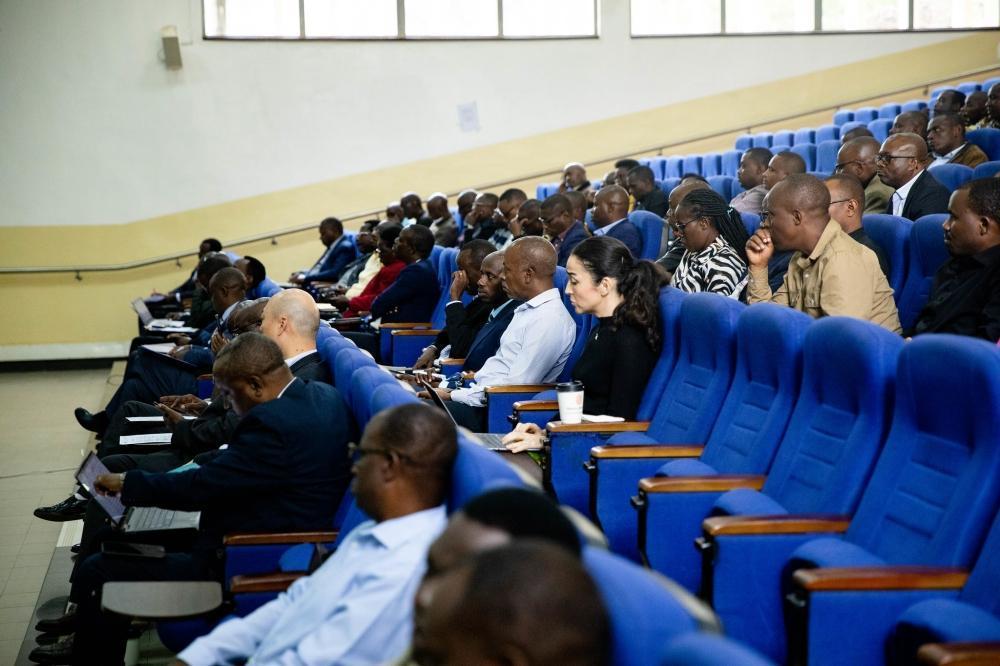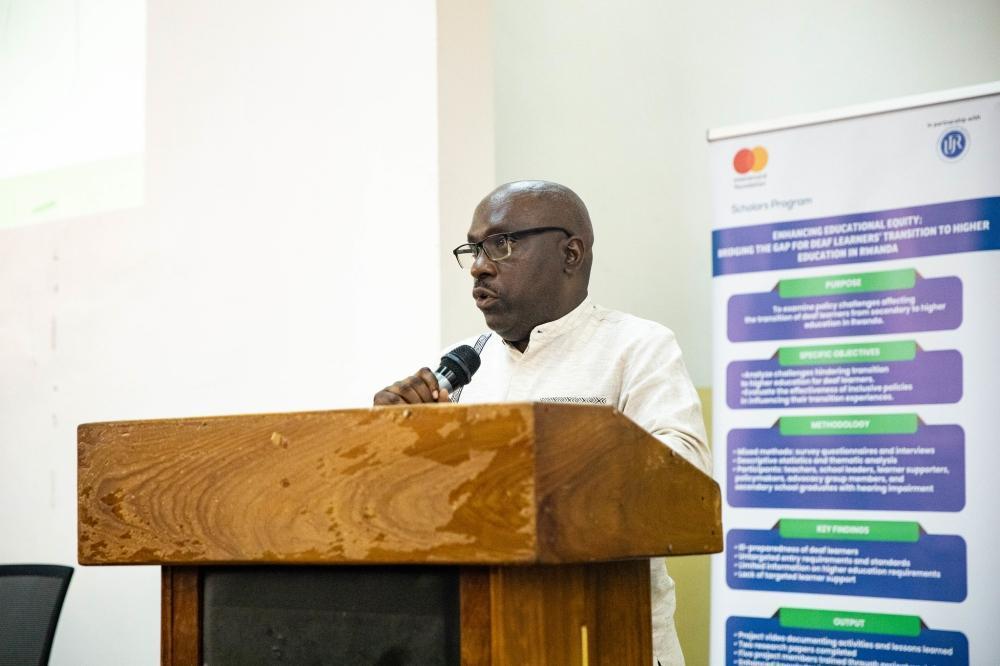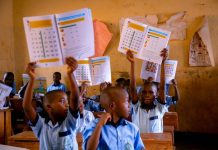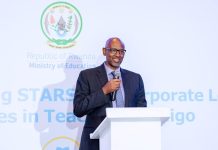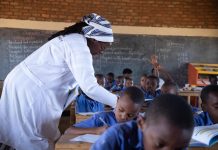Africa-Press – Rwanda. The Leaders in Teaching (LIT) programme has improved the quality of teaching and leadership in secondary education, according to Dr.Claude Karegeya, the Acting Principal of the University of Rwanda – College of Education (UR-CE).
The programme was funded by the Mastercard Foundation and implemented by the University of Rwanda – College of Education (UR-CE).
Dr Claude Karegeya, Acting Principal of the University of Rwanda College of Education, spoke at the closing of the Leaders in Teaching (LIT) program.
The implementation of the seven-year project, which started in 2018 and ended in 2025, was aimed at strengthening Rwanda’s education system.
He said the programme focused on improving the quality of teaching and leadership in secondary education through key interventions such as Competency-Based Curriculum (CBC) implementation, mentorship of pre-service teachers, integration of ICT in teaching and learning, and strengthening research and innovation capacity.
Dr.Jeannette Musengimana
The initiative has contributed significantly to enhancing teacher education programmes, promoting evidence-based practice, and building institutional capacity for continuous professional development.
As the LIT Programme concludes, a dissemination workshop was organised on 30 October to provide a platform to showcase achievements, share lessons learnt, and discuss sustainability strategies for institutionalising successful practices in Rwanda’s education ecosystem.
L–R Albine Niyogushimwa, a pre-service teacher from UR-CE Rukara Campus; Jeannette Musengimana, a UR-CE lecturer and researcher; Olivier Habimana, moderator; Theophile Habanabakize, mentor and Head of Studies at GS Mukarange Catholiqu
The workshop helped to share evidence and testimonies from programme beneficiaries and implementing partners, reinforce partnerships and knowledge exchange among teacher education stakeholders in Rwanda.
It brought together approximately 60 participants including senior officials from the Ministry of Education (MINEDUC) and Rwanda Basic Education Board (REB), representatives from the Mastercard Foundation, UR management, academic staff, and LIT implementing team members, school leaders, mentors, and beneficiaries of LIT interventions, development partners and other education stakeholders.
Prof. Alphonse Uworwabayeho, a UR-CE lecturer and the coordinator of CBC (1)
“Even when a project ends, trained staff should continue activities independently. Collaboration with stakeholders helps formalise and maintain partnerships,” Dr Karegeya noted.
LIT programme progress status in numbers
According to Professor Wenceslas Nzabalirwa, the Academic Lead of the LIT project was aimed at enhancing the capacity of the University of Rwanda – College of Education (UR-CE) and non-URCE academic staff to apply relevant pedagogies and assessment approaches in line with the Competency-Based Curriculum (CBC), strengthening pre-service teacher practicum in line with CBC, strengthening digital content development, the use of ICT and blended learning programmes as well as building institutional capacity in research output to advance teaching and learning.
Professor Wenceslas Nzabalirwa, the Academic Lead of the LIT project, delivers his remarks during the event in Kigali on October 30. Photos by Dan Gatsinzi (1)
In the practicum component, 1,577 school attachment mentors were trained, exceeding the target of 900.
School attachment mentors are experienced teachers in secondary schools who guide and supervise pre-service teachers (students training to become teachers) during their practical teaching experience, often called school attachments or teaching practicum.
The programme is funded by the Mastercard Foundation and implemented by the University of Rwanda – College of Education (UR-CE).
Nzabalirwa said 11,793 school visits and classroom observations were organised, increasing from the 1,000 that had been targeted.
The report shows that 182 (34 female) URCE academic supervisors in practicum/school attachment supervision were trained, surpassing the target of 170.
Lesson observation forms were revised to align with CBC and practicum and are currently in use to assess pre-service teachers on practicum.
At least 36 modules for subject-specific teaching methods were revised to incorporate practicum activities.
In the Competency-Based Curriculum component, a micro-teaching lab was established at URCE Rukara campus while students were trained on smart classrooms.
The programme trained 22 champions (18 males and four females) on Competency-Based Curriculum principles, pedagogy, technology and research programmes.
At least 182 other UR-CE academic staff in the department by UoT. The Postgraduate Certificate of Learning and Teaching in Higher Education (PGCLTHE) programme was reviewed and shifted to online or blended mode of delivery.
It was digitalised to make it more relevant, practical and accessible for both trainers and students.
The initiative trained 1,625 (907 males and 718 females) URCE students on using smart classrooms and the micro-teaching lab. In the ICT component, the programme distributed 181 laptops for academic staff.
Ten facilitators and lecturers (4 females and 6 males) were trained on assistive technologies used by students with visual disabilities.
More than 500 online modules were uploaded to the UR e-learning platform. The offline content was shifted to the Moodle platform.
A digital media unit was established at URCE Rukara Campus. Four smart classrooms were established at this campus.
As part of the research component, three editions of international conference on reshaping education for sustainable development were held in Kigali, Rwanda under the Mastercard Foundation’s Leaders in Teaching (LIT) programme throughout the three consecutive years from 2023 to 2025.
Through programme, an international research conference was organised by UR-CE in collaboration with the Mastercard Foundation and UN Sustainable Development Solutions Network in March 2023 under the theme “Reshaping Education for Sustainable Development”, bringing together 15 countries.
As part of the research component, the 2nd international conference on reshaping education for sustainable development attracted 174 participants including 129 Rwandans and 31 internationals.
The 3rd international research conference attracted 183 participants from 18 countries, both regional and international, in Kigali. Thirty (30) research projects were also funded.
They include three projects for the 1st cohort, seven for the 2nd cohort, nine for the 3rd cohort, and 11 for the 4th cohort.
In addition to the above, so far 21 papers have been published in peer-reviewed journals while 39 are under review or have been presented at conferences, showing strong improvement in publication culture.
Key lessons learnt
According to Nzabalirwa, curriculum alignment is crucial.
“Training must be directly tied to the competencies outlined in the curriculum. Educators need clarity on learning outcomes, teaching strategies, and assessment methods that reflect competency-based goals. Misalignment leads to confusion and inconsistent implementation across schools.”
He said peer-to-peer learning, mentoring, and professional learning communities have proven effective in reinforcing new teaching approaches as teachers benefit from sharing experiences, challenges and solutions which builds collective expertise and morale. Ongoing professional development is essential.
Continuous coaching, refresher courses, and digital learning platforms help educators adapt to evolving curriculum demands.
“Pre-service teachers need to be exposed to the real-life experience at an early stage of teacher education so as to build confidence, understand and appreciate what it means to be a teacher.
Thus, UR-CE decided to embed practicum in the revised academic programmes whereby 1st-year students will be doing school practice.”
In the revised programme, the college decided to expose student teachers throughout their teacher education process whereby there will be school practice in year 1, school attachment in year 2, school attachment in year 3 and year 4.
Challenges
The observed challenges included delayed implementation, Covid-19 that affected progress as schools were closed, as well as a mismatch between the university academic calendar and the secondary school calendar.
Other challenges included balancing teaching workload and aligning research activities with academic calendars, while the one-year research project timeline was too short.
This resulted in a request for extension, which was granted by UR-CE.
There was also a large number of pre-service teachers, surpassing the target of 1,000, since the government decided to increase the enrolment rate of those joining education under government incentives.
UR commits to sustain the project achievements
Emmanuel Nkurikiyimana, the Chief Finance Officer at the University of Rwanda, who represented the UR Vice Chancellor at the closing of the Leaders in Teaching (LIT) program
Emmanuel Nkurikiyimana, the Chief Finance Officer at the University of Rwanda who represented the UR Vice Chancellor, said the project’s journey has strengthened the quality and resilience of Rwanda’s education system.
“The programme supported Rwanda’s vision of producing highly competent, innovative, and ethical teachers capable of preparing learners for a rapidly changing world. These interventions have enhanced the quality and relevance of education in our schools and inspired a new generation of teachers who are creative, reflective, and responsive to learners’ needs,” he noted.
The collaboration, he said, has also positioned the University of Rwanda as a leading hub for innovation in education.
“According to the 2024 Times Higher Education Sub-Saharan Africa University Rankings, the University of Rwanda is now among the top six universities in the region,” he said.
“This recognition is not merely a statistic—it reflects our collective effort and the trust the University has earned as a leading institution for innovation and research.”


For More News And Analysis About Rwanda Follow Africa-Press

